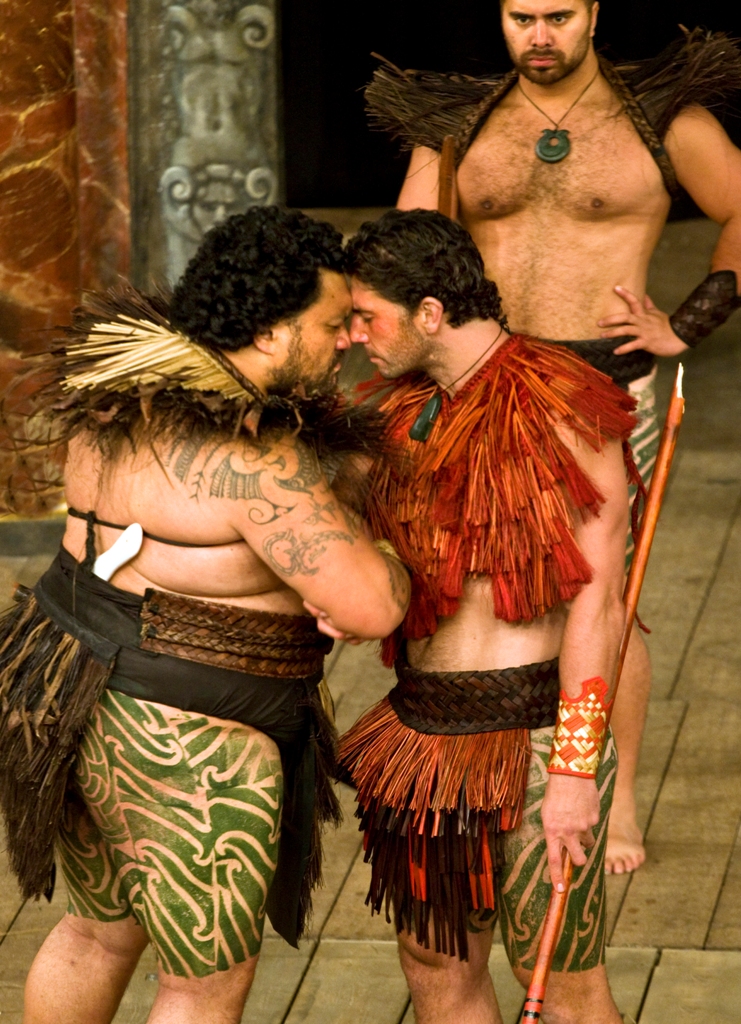Globe to Globe: Troilus & Cressida, Shakespeare's Globe | reviews, news & interviews
Globe to Globe: Troilus & Cressida, Shakespeare's Globe
Globe to Globe: Troilus & Cressida, Shakespeare's Globe
Maori visitors get 37-play Shakespeare sequence off to a magnificent start

So, what's the "problem"? All is right with the world - or the theatre at least - in the Maori-language staging of Troilus and Cressida from the Auckland-based Ngakau Toa troupe that pierces right to the troubling heart of this first of Shakespeare's three so-called "problem plays".
Packed with testosterone yet shot through with the inertia prompted by a Trojan War that has been raging for seven years with no end in sight, Troilus is a wonderfully strange and extraordinary creation that in its nihilism, even decadence, often seems the most modern work in the canon; small wonder the play languished in Shakespeare's day only to have found favour in more recent times. To that end, House and her company of 14 tap into the undeniable muscularity of a potentially talky text that exists in thrall to both bloodlust and carnality, martial combat and erotic conquest. Let's just say that these actors had me from their opening haka, or warrior dance.
The performances register across the board, in roles small as well as large
Indeed, the ensemble seems alert to this play in ways that various English-language productions (no naming names) haven't managed of late. Its self-evident centrepiece is the creepily obsequious, voyeuristic Pandarus (Cressida's uncle) of Rawiri Paratene, an alumnus of the film Whale Rider who appeared in a Globe Romeo and Juliet three years ago. Here called Panatara in accordance with a skilfully filleted version of the Bard that finds equivalent Maori names for opposing factions and the women who are passed like chattel between them, this Pandarus emerges as a sickly outsider to intimate relations that one senses he has never known himself, his final turning on the audience impressing as the last-ditch imprecations of a man cut off by the one person, namely Troilus (or, here, Toroihi), whom he most covets.
The performances register across the board, in roles small as well as large. Given more stage time than she is allowed by Shakespeare, Waimihi Hotere's Kerenga/Cassandra balefully underscores the galloping tragedy, in much the same way as is achieved by James Webster's Menerau/Menelaus who also doubles as an on-stage musician sending up plaintive notes of longing and despair.
 The warring factions are (bravely, given the prevailing cold and damp of an Arctic April evening in London) played by a panoply of barely clothed men, their thighs tattooed, who neatly individuate roles that can blur on the page. One feels, for once, for Aikiri/Achilles (Matu Ngaropo) following the death of his beloved Patokihi/Patroclus (Rangi Rangitukunoa), just as the post-coital bliss transmitted by Awhina Rose Henare Ashby's radiant Kahira/Cressida exists in disturbing contrast to the grievous object of sexual barter that the same character becomes later on; her hair at one juncture constitutes a neat visual joke all its own.
The warring factions are (bravely, given the prevailing cold and damp of an Arctic April evening in London) played by a panoply of barely clothed men, their thighs tattooed, who neatly individuate roles that can blur on the page. One feels, for once, for Aikiri/Achilles (Matu Ngaropo) following the death of his beloved Patokihi/Patroclus (Rangi Rangitukunoa), just as the post-coital bliss transmitted by Awhina Rose Henare Ashby's radiant Kahira/Cressida exists in disturbing contrast to the grievous object of sexual barter that the same character becomes later on; her hair at one juncture constitutes a neat visual joke all its own.
Tehiti/Thersites, the play's boil-obsessed malcontent, is unexpectedly played by an impish yet beautiful actress (Juanita Hepi) who appears out a trap door and hides behind the Globe pillars as required, her aural quest for knowledge as keen as Pandarus's visual one, while Xavier Horan's Hiakita/Hector ought surely to catch the attention of a London modelling agent or two if he stays in town long enough. (Scotty Morrison's Akamemana/Agamemnon runs Horan a close second.)
English-language translations either side of the house cue the specific content of each scene, though I'd bet that anyone who has done even the slightest bit of homework will follow proceedings just fine. Come the tumultuous finale after nearly three hours, and there was no doubt that the Globe to Globe company who traveled the furthest to take part has got this never-to-be-repeated venture off to a fully resounding start. Here, then, is the actual "problem": how to rearrange life so as to stay put on Bankside for the next six weeks.
Explore topics
Share this article
The future of Arts Journalism
You can stop theartsdesk.com closing!
We urgently need financing to survive. Our fundraising drive has thus far raised £49,000 but we need to reach £100,000 or we will be forced to close. Please contribute here: https://gofund.me/c3f6033d
And if you can forward this information to anyone who might assist, we’d be grateful.

Subscribe to theartsdesk.com
Thank you for continuing to read our work on theartsdesk.com. For unlimited access to every article in its entirety, including our archive of more than 15,000 pieces, we're asking for £5 per month or £40 per year. We feel it's a very good deal, and hope you do too.
To take a subscription now simply click here.
And if you're looking for that extra gift for a friend or family member, why not treat them to a theartsdesk.com gift subscription?
more Theatre
 Troilus and Cressida, Globe Theatre review - a 'problem play' with added problems
Raucous and carnivalesque, but also ugly and incomprehensible
Troilus and Cressida, Globe Theatre review - a 'problem play' with added problems
Raucous and carnivalesque, but also ugly and incomprehensible
 Clarkston, Trafalgar Theatre review - two lads on a road to nowhere
Netflix star, Joe Locke, is the selling point of a production that needs one
Clarkston, Trafalgar Theatre review - two lads on a road to nowhere
Netflix star, Joe Locke, is the selling point of a production that needs one
 Ghost Stories, Peacock Theatre review - spirited staging but short on scares
Impressive spectacle saves an ageing show in an unsuitable venue
Ghost Stories, Peacock Theatre review - spirited staging but short on scares
Impressive spectacle saves an ageing show in an unsuitable venue
 Hamlet, National Theatre review - turning tragedy to comedy is no joke
Hiran Abeyeskera’s childlike prince falls flat in a mixed production
Hamlet, National Theatre review - turning tragedy to comedy is no joke
Hiran Abeyeskera’s childlike prince falls flat in a mixed production
 Rohtko, Barbican review - postmodern meditation on fake and authentic art is less than the sum of its parts
Łukasz Twarkowski's production dazzles without illuminating
Rohtko, Barbican review - postmodern meditation on fake and authentic art is less than the sum of its parts
Łukasz Twarkowski's production dazzles without illuminating
 Lee, Park Theatre review - Lee Krasner looks back on her life as an artist
Informative and interesting, the play's format limits its potential
Lee, Park Theatre review - Lee Krasner looks back on her life as an artist
Informative and interesting, the play's format limits its potential
 Measure for Measure, RSC, Stratford review - 'problem play' has no problem with relevance
Shakespeare, in this adaptation, is at his most perceptive
Measure for Measure, RSC, Stratford review - 'problem play' has no problem with relevance
Shakespeare, in this adaptation, is at his most perceptive
 The Importance of Being Earnest, Noël Coward Theatre review - dazzling and delightful queer fest
West End transfer of National Theatre hit stars Stephen Fry and Olly Alexander
The Importance of Being Earnest, Noël Coward Theatre review - dazzling and delightful queer fest
West End transfer of National Theatre hit stars Stephen Fry and Olly Alexander
 Get Down Tonight, Charing Cross Theatre review - glitz and hits from the 70s
If you love the songs of KC and the Sunshine Band, Please Do Go!
Get Down Tonight, Charing Cross Theatre review - glitz and hits from the 70s
If you love the songs of KC and the Sunshine Band, Please Do Go!
 Punch, Apollo Theatre review - powerful play about the strength of redemption
James Graham's play transfixes the audience at every stage
Punch, Apollo Theatre review - powerful play about the strength of redemption
James Graham's play transfixes the audience at every stage
 The Billionaire Inside Your Head, Hampstead Theatre review - a map of a man with OCD
Will Lord's promising debut burdens a fine cast with too much dialogue
The Billionaire Inside Your Head, Hampstead Theatre review - a map of a man with OCD
Will Lord's promising debut burdens a fine cast with too much dialogue

Add comment